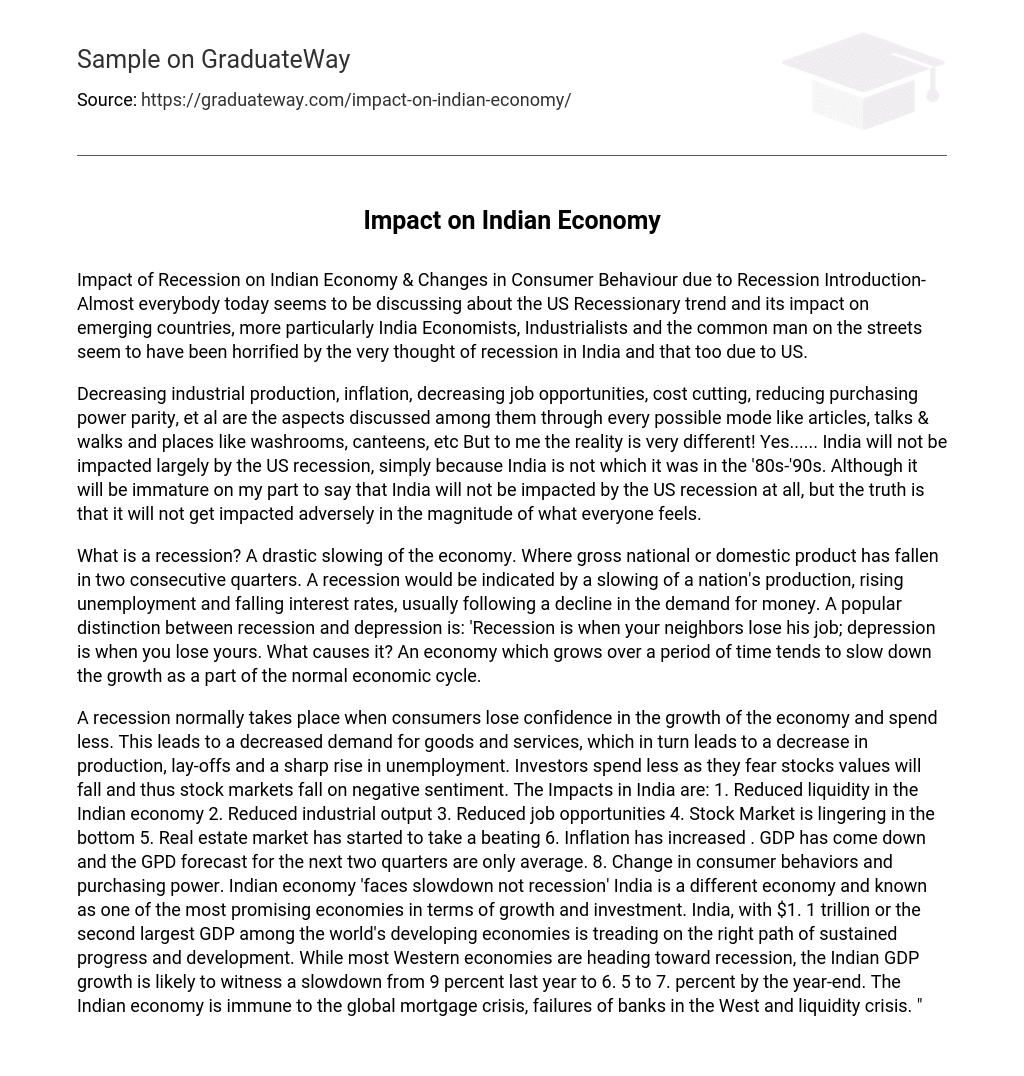Impact of Recession on Indian Economy & Changes in Consumer Behaviour due to Recession Introduction- Almost everybody today seems to be discussing about the US Recessionary trend and its impact on emerging countries, more particularly India Economists, Industrialists and the common man on the streets seem to have been horrified by the very thought of recession in India and that too due to US.
Decreasing industrial production, inflation, decreasing job opportunities, cost cutting, reducing purchasing power parity, et al are the aspects discussed among them through every possible mode like articles, talks & walks and places like washrooms, canteens, etc But to me the reality is very different! Yes…… India will not be impacted largely by the US recession, simply because India is not which it was in the ’80s-’90s. Although it will be immature on my part to say that India will not be impacted by the US recession at all, but the truth is that it will not get impacted adversely in the magnitude of what everyone feels.
What is a recession? A drastic slowing of the economy. Where gross national or domestic product has fallen in two consecutive quarters. A recession would be indicated by a slowing of a nation’s production, rising unemployment and falling interest rates, usually following a decline in the demand for money. A popular distinction between recession and depression is: ‘Recession is when your neighbors lose his job; depression is when you lose yours. What causes it? An economy which grows over a period of time tends to slow down the growth as a part of the normal economic cycle.
A recession normally takes place when consumers lose confidence in the growth of the economy and spend less. This leads to a decreased demand for goods and services, which in turn leads to a decrease in production, lay-offs and a sharp rise in unemployment. Investors spend less as they fear stocks values will fall and thus stock markets fall on negative sentiment. The Impacts in India are: 1. Reduced liquidity in the Indian economy 2. Reduced industrial output 3. Reduced job opportunities 4. Stock Market is lingering in the bottom 5. Real estate market has started to take a beating 6. Inflation has increased . GDP has come down and the GPD forecast for the next two quarters are only average. 8. Change in consumer behaviors and purchasing power. Indian economy ‘faces slowdown not recession’ India is a different economy and known as one of the most promising economies in terms of growth and investment. India, with $1. 1 trillion or the second largest GDP among the world’s developing economies is treading on the right path of sustained progress and development. While most Western economies are heading toward recession, the Indian GDP growth is likely to witness a slowdown from 9 percent last year to 6. 5 to 7. percent by the year-end. The Indian economy is immune to the global mortgage crisis, failures of banks in the West and liquidity crisis. “Indian economy is based on robust fundamentals and enjoys the status of one of the most dynamic and growing economies in the world with over 9 percent GDP last year. ” India itself is a biggest consumer market with 300 million of middle class and the lowest debt ratio of 22 percent of the GNP. The country enjoys the highest savings rate of 28 percent of the GDP. ” Change in consumer behaviors due to recession in India. Today’s recession has affected all over the world.
Due to the economic slowdown many companies loses their contract, probably it influence the employees and fails to get enough money and loosing jobs. So in our daily activities it affects different problems in life and our lifestyle turns very worse. But if people have a mentality to overcome this situation he himself decreases his expences. and should follow the tables. Easily his life will go happiness. The fact that recession is changing the consumer behaviors as well as the attitudes in the current retail market . The customer has become more loyal & they stick to the supermarket which gives them value for money.
I am not sure how the income tracker of an average middle class family this year, but average family has seen less spending per month. Even during an economic downturn, consumer spending continues. However, buyer attitudes and behavior patterns alter substantially in recession as consumers delay replacing serviceable products and focus on achieving value for money, seeking out deals and eliminating indulgences. This insight explores how consumers prioritize spending during a recession and provides implications and recommendations for action.





